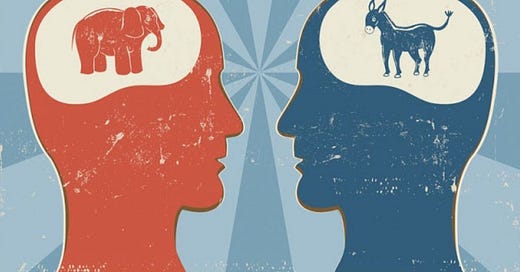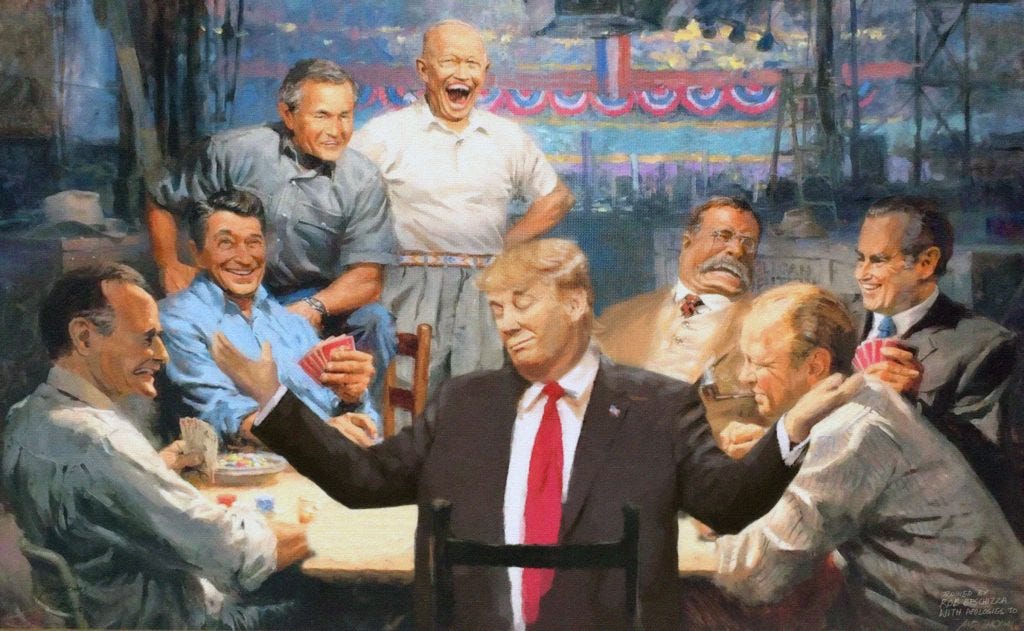Ideology Isn't About Ideas
When I first encountered ideologies and religions, I took them at face value, as attempts to understand the world. I assumed that people sincerely believed them and would use them to infer further consequences -- or, in the event that they couldn't accept a consequence, would admit that they were wrong and change their ideology. I tried to evaluate ideologies based on evidence and correspondence with reality, which I assumed was what one was supposed to do.
Then, over a period of years, I gradually realized that, for the rest of the world, it wasn't really about ideas and understanding the world. This remains surprising and disappointing to me.
How Can Ideology Not Be About Ideas?
Wait, an ideology is a certain kind of system of ideas, so in what way could it "not be about ideas"? What I mean is that
a. The reasons people choose an ideology are extraneous to the intellectual characteristics of the ideology (the arguments, the evidence, the explanatory virtues) and more to do with arbitrary extrinsic characteristics, like who else holds that ideology, or what vague emotional associations it carries.
b. Most people don't take the contents of their ideology all that seriously -- they don't actually use it to understand the real world. It's mostly something to say, and to berate other people for not saying. They use ideological debate as a proxy for tribal contests. They don't support group G because of idea X; they support X because it's the idea associated with G.
I observed in an earlier post (https://fakenous.net/?p=1674) that people who profess Christianity often don't attend church, or read the Bible, or follow its teachings. Few of them really turn the other cheek, nor do they seem to eagerly anticipate death (as one should if one expects to go to heaven). I think a lot of people are like that about politics too. E.g., you have the people who say Covid lockdowns are essential, but then they go out to a big gathering. Or people who say the elections are rigged, but they still go to vote.
What Is It About, Then?
Personality
It's about a lot of things, but one of the big ones is: personality. Adopting an ideology is a form of self-expression. You pick the ideology that fits you.
There are psychology studies that measure the correlation between political ideology and personality traits. Especially the "big 5" personality traits--
Openness to experience
Conscientiousness
Extraversion
Agreeableness
Neuroticism
Conservatives are higher in conscientiousness. Liberals are higher in openness, agreeableness, and neuroticism. Why should there be a correlation between these traits and one's political beliefs? It's obviously because the personality traits are affecting people's beliefs. And that's because people are picking an ideology to "fit their style", so to speak, rather than simply evaluating ideologies based on intellectual reasons.
Genes
There's also a study that finds that political beliefs are heritable. (Alford et al, "Are Political Orientations Genetically Transmitted?") They get a heritability estimate of 0.53 for political orientation (p. 162), much larger than the influence of either shared environment or unshared environment. That's kind of weird, isn't it -- who knew that you could genetically transmit political beliefs? But of course, you don't directly transmit beliefs; you genetically transmit personality traits, and people pick their political beliefs based on their personality traits.
I think this is all pretty awful, because I think the truth about political, philosophical, and religious issues actually matters. We don't need beliefs that make us feel comfortable. We need beliefs that correspond to reality, if we want to actually solve any social problems.
Tribes
You might wonder how specific personality traits fit with specific political positions -- e.g., how does openness to experience explain believing that fetuses don't have rights?
I would conjecture that the primary choice people make is not so much which propositions they want to be wedded to, but which group of people they want to affiliate with. Maybe there's only a very tenuous link between some personality trait and some particular political position, but it's enough to make that position slightly more prevalent, initially, among people with that trait. But once those people decide that they belong to "the same side" in society, there's psychological pressure for individual members of the tribe to conform their beliefs to the majority of their tribe, and to oppose the beliefs of "the other side".
So, e.g., you decide that fetuses don't have rights because the fetus-rights position is associated with the other tribe, and you don't want to be disloyal to your own side by embracing one of the other side's positions. Of course, you never say this to yourself; you just automatically find all of your side's arguments "more plausible".
Implications
Anyway, I think there are two lessons to draw. One is political skepticism: since people's political beliefs are largely based on their personality traits (which are largely genetic), yours in particular are probably largely based on your personality traits. If that's true, they're probably not highly responsive to evidence or reasons. Of course, you might think you have all sorts of evidence and reasons for them, but that's what most people think. The best explanation is that you pick the beliefs that match your personality, then unconscious or semi-conscious mechanisms in your mind go and find rationalizations for them.
I don't think political knowledge is impossible, though, merely rare. And some people are better positioned than others. Here's a thing to think about: how well do your political beliefs match your personality? E.g., do you basically have the personality traits that people with your political orientation usually have? If so, you've probably done the awful thing that I've been complaining about. On the other hand, if not, then you might be among the few objective people.
Here, for example, is a good test of objectivity. If you meet a right-wing (conservative or libertarian) person who is a vegan, then that person might actually be rational, unlike most of humanity. They might actually be looking at reasons and evidence. Most right-wing people refuse to think about veganism, because being concerned about animals just doesn't fit their personality. It doesn't matter what you say to them, because they don't care about the cognitive content of ideas.
Here's the other implication: Be somewhat tolerant of other people's political beliefs. The reason they disagree with you probably isn't that they're evil or they love to ignore facts. The reason is probably that they have a somewhat different personality profile from you, which was largely genetically programmed into them, just as your personality profile was genetically programmed into you.
How Ideology Shifts
What made me think about this recently was noticing how "conservatism" has changed over the last several years. It's pretty striking. Some serious conservatives, like George Will, have left the Republican party. But the overwhelming majority of Republicans don't mind the change at all.
The whole time when I was growing up, the Republicans were anti-Russia hawks. The more Republican you were, the more you hated the Russians. That continued right up until 2016, when the Republicans suddenly realized that it would be good to establish good relations with Russia, etc.
The Republicans also used to support "family values", they would argue that moral character is important in a leader, that you need good, pious Christians in government, etc. Again, right up until 2016, when they realized that that stuff doesn't really matter.
There are some pretty striking videos to remind us of the party's past:
1. Here is how John McCain responded to personal attacks on Obama by McCain's own supporters: https://www.youtube.com/watch?v=JIjenjANqAk. He corrects his supporters and explains that Obama is a decent man who merely has some policy disagreements with McCain. Today, almost no Republican would do that. (Maybe Romney.)
2. Here is how George H.W. Bush and Ronald Reagan responded to a question about immigration: https://www.youtube.com/watch?v=YsmgPp_nlok. That's from a debate when Bush and Reagan were competing for the Republican Presidential nomination. Both of them talk about how essential immigration is, and how many decent people are illegal immigrants. No Republican today would do that.
This is part of why I say ideology isn't about ideas. If people actually cared about ideas, a party couldn't just radically shift its positions and still have pretty much the same people supporting them and the same people opposing them. Example 1 suggests that maybe it isn't even about personality either. It's just completely meaningless tribalism.
By the way, notice the difference between the elites and the masses. The elites tend to be unhappy when a party shifts its positions, and sometimes they leave the party. The masses, though, don't particularly care. That's because the elites -- for example, conservative commentators, or Republican party leaders -- actually believe their ideology. For the masses, professing an ideology is just like waving a "hurray for my side" flag -- and who cares if they change the design of the flag?




